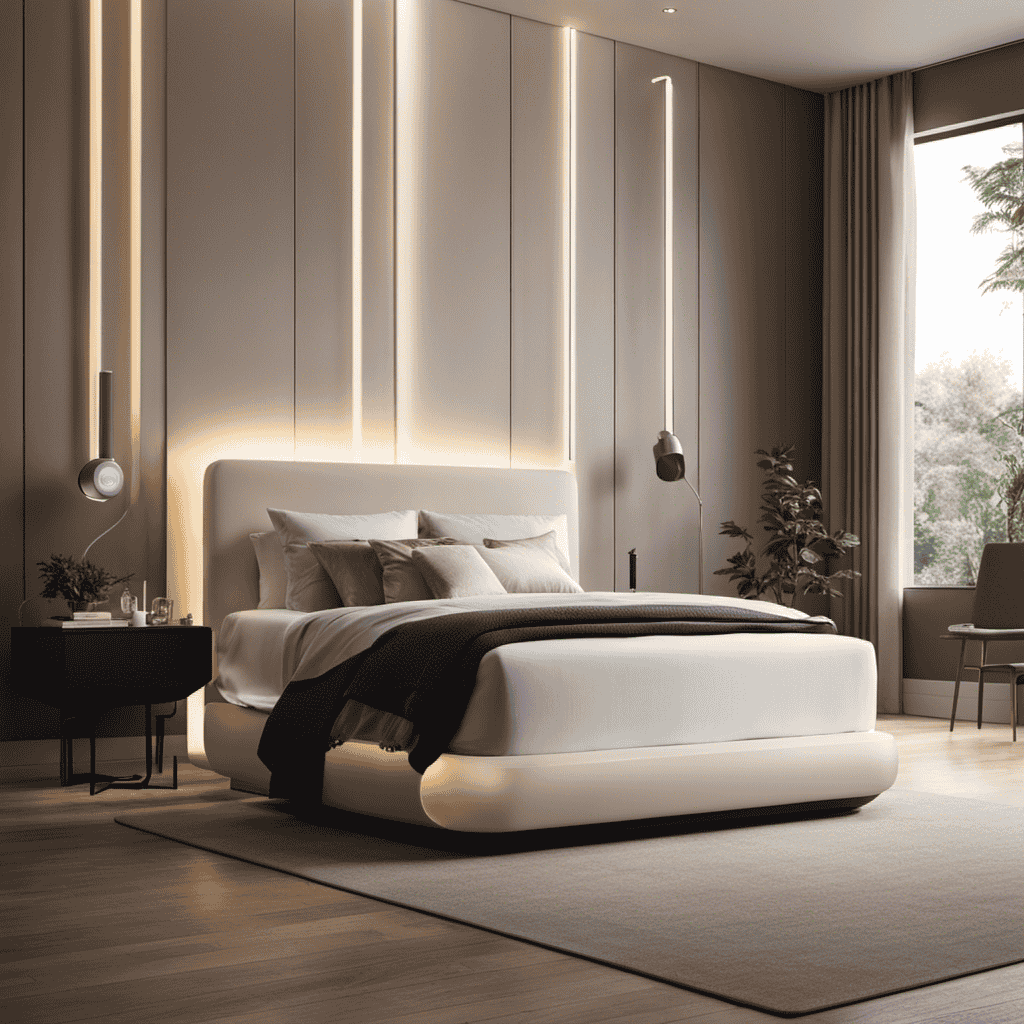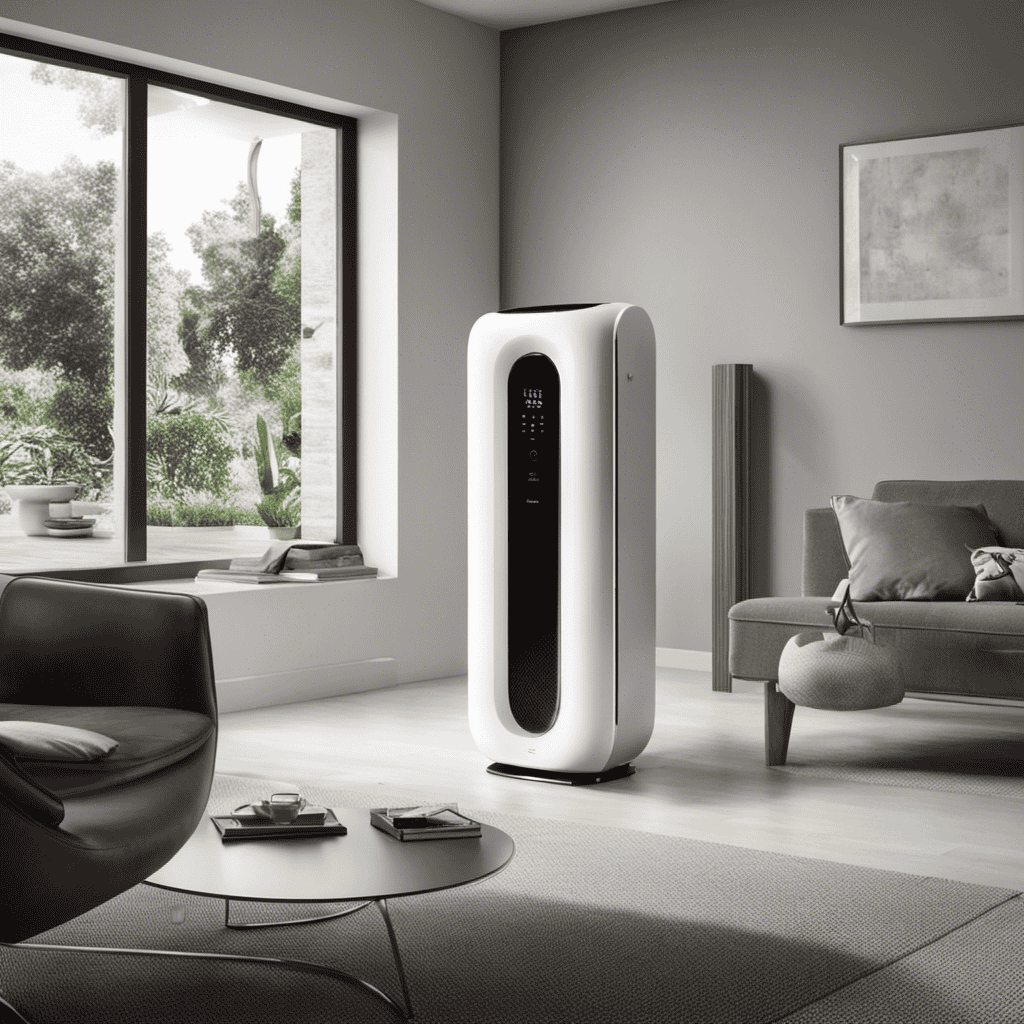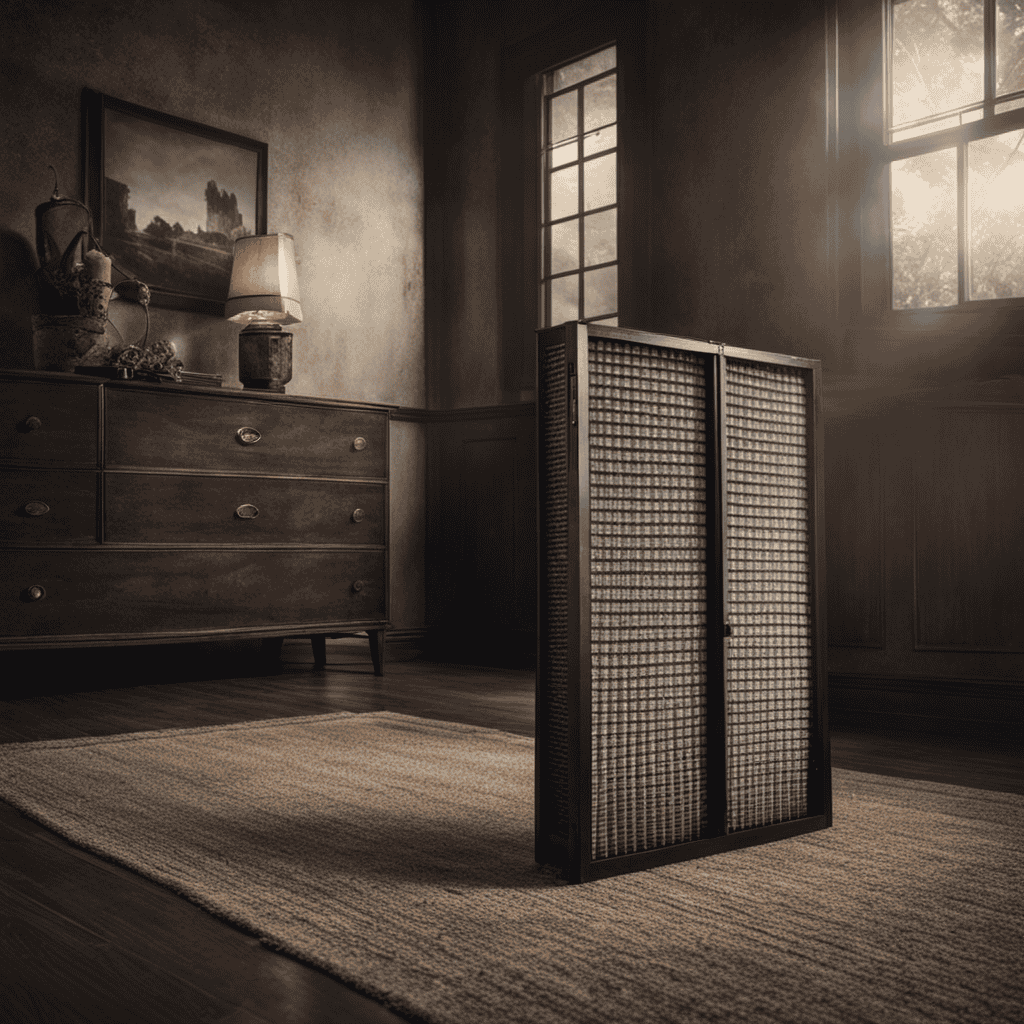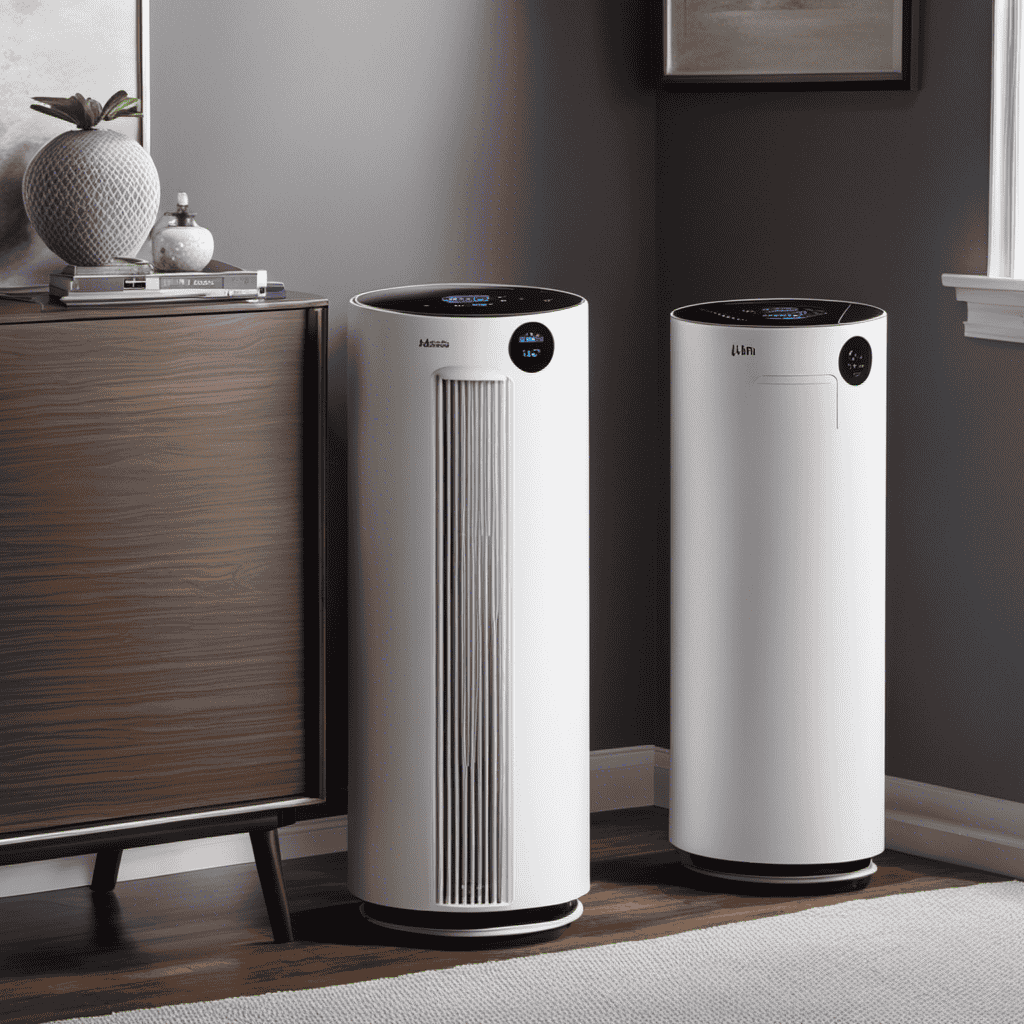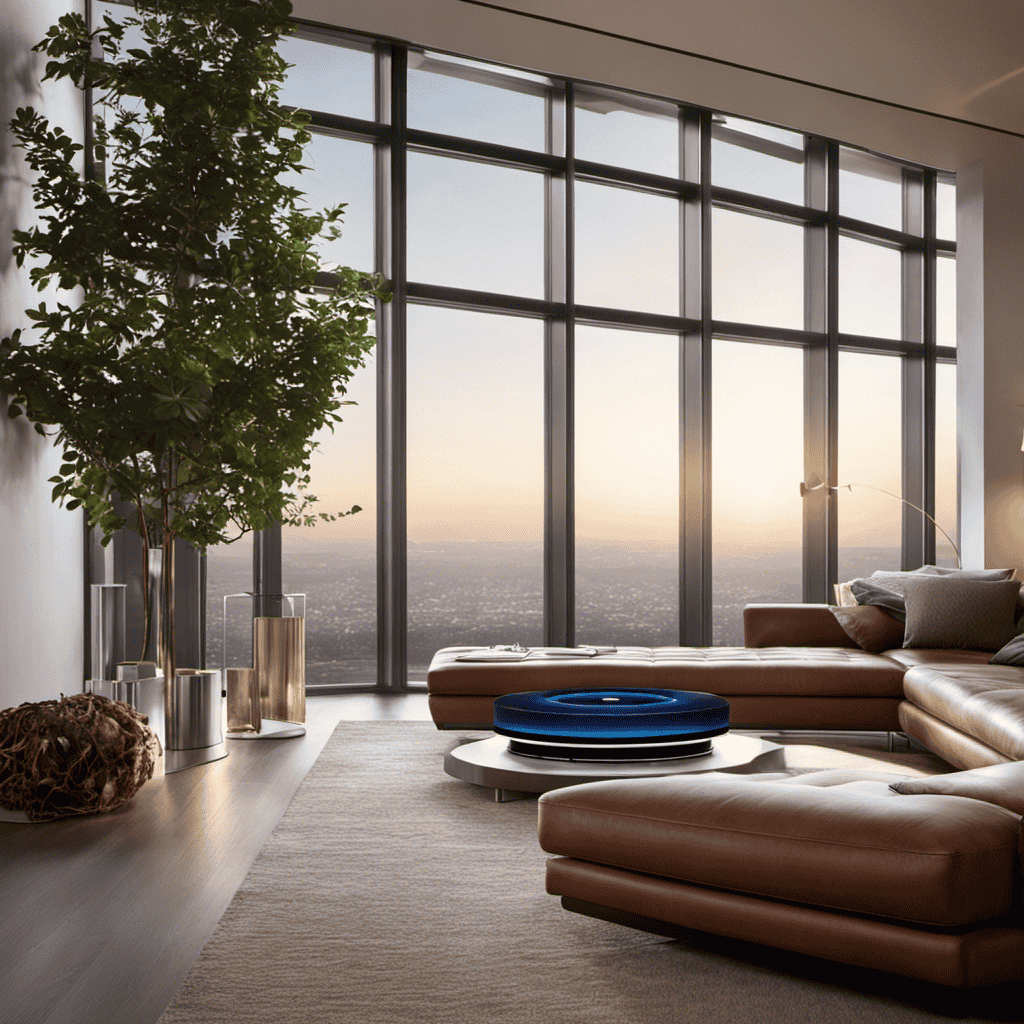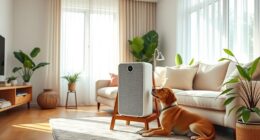Upon arriving home from a busy day, I inhale deeply and notice the dryness in the air right away. It’s causing discomfort and irritation, prompting me to seek a solution.
That’s when the question arises: what is better, a humidifier or an air purifier?
In this article, we will explore the benefits of both options, consider important factors when choosing between them, and discuss the health impacts of dry air and poor indoor air quality.
Additionally, we will delve into the maintenance and upkeep required for both humidifiers and air purifiers.
Key Takeaways
- Humidifiers and air purifiers both have their benefits, including maintaining the right level of humidity, alleviating respiratory issues, preventing the spread of airborne viruses and bacteria, and improving sleep quality.
- Dry air and poor indoor air quality can lead to a range of health issues, including respiratory problems, allergies, and cardiovascular diseases. Prioritizing clean air in homes and workplaces is crucial for overall well-being.
- Clean air promotes increased productivity, improved sleep quality, and has a positive impact on physical and mental health.
- When choosing between a humidifier and an air purifier, it is important to consider specific needs and concerns. If dry air is the main issue, a humidifier may be more beneficial, while an air purifier may be the better choice for allergies or pollution. Some models combine both functions for comprehensive air treatment.
Benefits of a Humidifier
There’s a lot of benefits to using a humidifier in your home.
Humidifiers help maintain the right level of humidity in the air, which is essential for our health and well-being. Adequate humidity is important because it can alleviate dry skin, dry eyes, and dry throat. It can also help soothe respiratory issues like allergies, asthma, and sinus congestion. Moreover, humidifiers can prevent the spread of airborne viruses and bacteria, as they thrive in dry environments. By increasing moisture in the air, humidifiers can also reduce snoring and improve sleep quality. Additionally, the importance of humidity extends to preserving furniture, wooden floors, and musical instruments, as dry air can cause them to crack or warp.
Now, let’s explore the advantages of an air purifier.
Advantages of an Air Purifier
One advantage of using an air purifier is that it helps to remove pollutants from the indoor environment. Air purifiers are designed to effectively capture and eliminate various contaminants such as dust, pet dander, allergens, smoke, and even microscopic particles. They work by utilizing advanced technology to filter the air and improve its quality.
Air purifier effectiveness can vary depending on the specific model and features. Some purifiers use HEPA filters, which are highly efficient at trapping particles as small as 0.3 microns. Others incorporate activated carbon filters to remove odors and chemicals from the air. Additionally, some air purifiers utilize UV-C light or ionizers to neutralize bacteria and viruses.
To better understand the advantages of air purifiers, let’s take a look at the table below:
| Advantages of Air Purifiers |
|---|
| Removes pollutants |
| Improves indoor air quality |
| Reduces allergy symptoms |
| Eliminates odors |
Factors to Consider When Choosing Between a Humidifier and an Air Purifier
When considering whether to choose a humidifier or an air purifier, you should evaluate factors such as your specific needs, the climate you live in, and any respiratory conditions you may have.
Both options have their advantages, so it’s important to weigh the pros and cons. In terms of energy efficiency, humidifiers generally use less electricity compared to air purifiers. However, air purifiers are often more effective in removing airborne pollutants and allergens from the air.
Cost effectiveness should also be taken into consideration. Humidifiers require regular maintenance and the cost of replacing filters, while air purifiers may have higher upfront costs but require less maintenance in the long run.
Ultimately, the decision between a humidifier and an air purifier depends on your individual circumstances and priorities.
Health Impacts of Dry Air
To improve your health, it’s important to address the impact of dry air on your respiratory system. Dry air can cause a variety of symptoms, including dry throat, coughing, congestion, and irritated nasal passages. These symptoms can be especially problematic for individuals with respiratory conditions such as asthma or allergies.
When we breathe in dry air, it can irritate our airways and cause inflammation, making it harder for us to breathe properly. Additionally, dry air can also lead to dry skin, itchy eyes, and worsen existing skin conditions. It’s crucial to take steps to combat the effects of dry air, such as using a humidifier to add moisture back into the air. By doing so, we can reduce the symptoms and improve our overall respiratory health.
Transitioning into the next section, poor indoor air quality can have significant impacts on our health.
Health Impacts of Poor Indoor Air Quality
As someone who’s passionate about promoting a healthy living environment, I believe it’s important to understand the health risks associated with pollutants and the benefits of clean air.
Poor indoor air quality can lead to various health issues, such as respiratory problems, allergies, and even cardiovascular diseases.
On the other hand, clean air provides numerous benefits, including improved lung function, better sleep quality, and a reduced risk of developing chronic diseases.
It’s crucial to prioritize clean air in our homes and workplaces to safeguard our well-being.
Health Risks of Pollutants
If you want to reduce the health risks of pollutants in your home, consider using either a humidifier or an air purifier. These devices can help improve the indoor air quality and minimize the negative health effects associated with poor air.
Here are four key health risks of pollutants that can be mitigated by using a humidifier or an air purifier:
-
Respiratory problems: Pollutants like dust, allergens, and mold spores can trigger or worsen respiratory conditions such as asthma and allergies.
-
Irritated airways: Indoor pollutants can irritate the airways, causing symptoms like coughing, wheezing, and shortness of breath.
-
Increased vulnerability to infections: Poor indoor air quality can weaken the respiratory system, making individuals more susceptible to respiratory infections.
-
Long-term health effects: Prolonged exposure to pollutants can lead to chronic respiratory diseases and other health issues over time.
Benefits of Clean Air
One way you can experience the benefits of clean air is by improving the indoor air quality in your home. By doing so, you can enjoy increased productivity and improved sleep quality. Clean air has a positive impact on our overall well-being and can have various benefits for our physical and mental health.
Here is a table highlighting the benefits of clean air:
| Benefits of Clean Air |
|---|
| Increased Productivity |
| Improved Sleep Quality |
When the air we breathe is clean, it allows us to focus better and be more productive in our daily tasks. Clean air also promotes better sleep by reducing the presence of allergens and pollutants that can disrupt our sleep patterns.
Improving the indoor air quality in your home can be achieved through various methods, such as proper ventilation, using air purifiers, and maintaining a clean living environment. It is essential to prioritize clean air to reap its numerous benefits and lead a healthier and more productive life.
Maintenance and Upkeep of Humidifiers
To properly maintain and keep your humidifier working efficiently, it’s important to regularly clean and replace the filters. This ensures that the air being released is clean and free from any impurities. Here are four essential steps to follow for proper humidifier maintenance:
-
Clean the tank: Empty and rinse the water tank daily to prevent the buildup of mineral deposits and bacteria.
-
Replace the filters: Depending on the type of filter, they should be replaced every 1-3 months to ensure optimal performance.
-
Check for mold and mildew: Regularly inspect the humidifier for any signs of mold or mildew. If detected, clean it thoroughly with a mixture of water and vinegar.
-
Use distilled water: Using distilled water instead of tap water helps prevent mineral buildup, which can affect the performance of the humidifier.
Maintenance and Upkeep of Air Purifiers
Regularly cleaning and replacing the filters is essential for keeping your air purifier working efficiently and ensuring that the air in your space is clean and free from impurities.
Cleaning techniques for air purifier filters vary depending on the type of filter you have. For reusable filters, you can typically wash them with water and mild soap, making sure to thoroughly rinse and dry them before reinserting.
Disposable filters should be replaced according to the manufacturer’s recommendations, usually every 3 to 6 months. To ensure proper filter replacement, it’s important to check the filter’s condition regularly.
Additionally, it’s a good idea to vacuum the exterior of your air purifier regularly to remove dust and debris that may accumulate.
Will a Humidifier Help with Allergies or Should I Use an Air Purifier Instead?
If you’re dealing with allergies, it’s important to understand the difference between a humidifier vs air purifier. While a humidifier adds moisture to the air to help with dryness and congestion, an air purifier removes allergens and pollutants. Consider your specific needs before deciding which one is best for you.
Frequently Asked Questions
Can a Humidifier Improve My Skin’s Appearance?
Using a humidifier can improve the appearance of my skin by providing proper hydration. Humidifiers add moisture to the air, preventing dryness that can lead to dull and flaky skin.
Do Air Purifiers Help With Pet Allergies?
Air purifiers can be effective in reducing pet allergies by removing pet dander and other allergens from the air. They work alongside vacuum cleaners to provide a comprehensive solution. Additionally, air purifiers can also help with dust mites.
Can a Humidifier Help With Reducing Snoring?
A humidifier can be helpful in improving sleep and relieving nasal congestion. It adds moisture to the air, which can help reduce snoring by lubricating the throat and reducing irritation in the nasal passages.
Are Air Purifiers Effective in Removing Cooking Odors?
Air purifiers are effective in removing cooking odors. They help to eliminate the lingering smells and improve indoor air quality. However, when it comes to dealing with specific issues like cigarette smoke or mold, different options like air purifiers for cigarette smoke or a humidifier vs dehumidifier for mold may be more suitable.
What Is the Recommended Humidity Level for Optimal Health?
The recommended humidity level for optimal health is between 30% to 50%. Maintaining this range offers several benefits such as improved respiratory health, reduced risk of infections, and relief from dry skin and allergies.
Conclusion
In conclusion, when it comes to choosing between a humidifier and an air purifier, the decision might seem overwhelming. However, after examining the benefits, advantages, and health impacts of both, it is clear that the air purifier reigns supreme.
With its ability to eliminate pollutants, allergens, and odors from the air, the air purifier takes cleanliness to a whole new level.
While the humidifier offers some relief for dry air, it simply cannot compete with the comprehensive purification abilities of the air purifier.
So, if you truly want the cleanest and freshest indoor air, the choice is clear – go for the air purifier.
